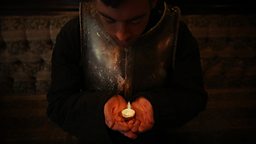The Once and Future King: Review: 6: The Candle in the Wind
Forced into a corner, Arthur is impotent to prevent the collapse of his great dream at the hands of his bastard son. And so the story comes to its bittersweet […]
Forced into a corner, Arthur is impotent to prevent the collapse of his great dream at the hands of his bastard son. And so the story comes to its bittersweet […]
 Forced into a corner, Arthur is impotent to prevent the collapse of his great dream at the hands of his bastard son.
Forced into a corner, Arthur is impotent to prevent the collapse of his great dream at the hands of his bastard son.
And so the story comes to its bittersweet close. Arthur cannot stop Mordred and Agravaine from revealing Guenever and Lancelot’s affair, which sets off a chain of events that brings down the dream of Camelot. Inevitably, condensing this into one hour of radio means that a lot of great material isn’t dramatised, with Brian Sibley sensibly concentrating on specific key events – the discovery of the lovers, the rescue of Guenever by Lancelot, their “trial” at Camelot and Lancelot’s banishment, and then the aftermath of the siege.
Arthur asks the obvious question – what on earth did Merlyn see in him? – and the answer speaks as much to our constant fascination with the myth and legend as it does the fictional reason within the story. These last scenes between Paul Ready and David Warner are their strongest, both in the writing and the playing, and Merlyn’s final narration makes for an apt conclusion.
As Sibley discusses in our interview with him and director Gemma Jenkins, the adaptation has used many different narrative conceits, and all are on show here. There’s sufficient material within White’s tour de force to create a 26 part version (shades of Lord of the Rings) but Sibley, Jenkins, Marc Beeby and David Hunter have given us six hours that have maintained the flavour and gist of White’s text. Sadly, a CD release doesn’t seem to be on the cards, so catch the episodes you can on iPlayer while they’re there before the hopefully inevitable repeat on Four Extra soon!
Verdict: A fitting conclusion to a highly effective dramatisation. 9/10
Paul Simpson